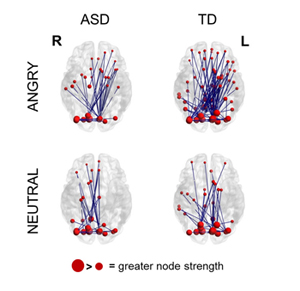Study finds under-connected “social brain” in adults with autism
Summary:
Using a type of brain imaging technique known as magnetoencephalography (MEG), researchers studied how different brain regions connect to one another while processing emotional information. The study led by The Hospital for Sick Children (SickKids) found reduced connectivity in the social brain regions among adults with autism.
TORONTO – One of the core characteristics of autism spectrum disorder is challenges with social and emotional interactions. This is thought to be caused by issues in the brain regions involved with processing social and emotional information, which experts call the “social brain”.

Using a type of brain imaging technique known as magnetoencephalography (MEG), researchers studied how these different brain regions connect to one another while processing emotional information (looking at angry, neutral and happy faces). The study led by The Hospital for Sick Children (SickKids) found reduced connectivity in the social brain regions among adults with autism, compared to the control group of adults who did not have autism. It is published in the journal Molecular Autism.
“Our findings shed light on important neural underpinnings of autism, and offer the potential for the development of new techniques to help with diagnosis, as well as assessment of treatments,” says Dr. Benjamin Dunkley, senior author on the study and Associate Scientist in Neurosciences & Mental Health at SickKids.
To understand the social environment, the brain must coordinate the information coming from different regions. Difficulties with emotional processing and recognizing the emotions of others have been shown in previous studies to be related to disturbances in functional connectivity among brain regions. In autism, this phenomenon is thought to include the “social brain”, a network of brain areas that activate during social situations, when reading emotional cues is needed.
“Uncoordinated or fewer interactions in the social brain regions could explain the underlying challenges that some individuals with autism face in social situations. The brain is simply not processing this type of information efficiently,” says Dunkley.
Studies using functional magnetic resonance imaging (fMRI), have shown reduced brain activity in parts of the social brain in individuals with autism who are at rest. For this study, Dunkley and the functional neuroimaging team used MEG, which, unlike other neuroimaging techniques, allowed the researchers to look at where and when activity in the brain is occurring, in real time. They focused on the interaction between the various brain regions during implicit, or automatic emotional processing, when participants were completing a simple attention task, but incidentally exposed to emotional faces.
This is critical, says Dunkley, because subconscious processing is known to rely on quick and automatic processes in the brain. “Understanding when and where the brain is activating during processing of emotional content is key to understanding the atypical socio-emotional processing in individuals with autism,” he adds.
Previous SickKids MEG research has investigated at connectivity in the “social brain” of children and teenagers with autism, under the direction of Dr. Margot Taylor, and showed similar results. “Our latest findings demonstrate that even after the brain has developed and matured, brain wave connectivity within the social brain underlies some of the social and emotional challenges facing individuals with autism regardless of age,” says Dunkley.
The study is funded by the Canadian Institutes of Health Research (CIHR to MJT) and SickKids Foundation.
The lead author is Rocco Mennella, Diagnostic Imaging, SickKids and Department of General Psychology, University of Padova.
This paper is an example of how SickKids is contributing to making Ontario Healthier, Wealthier and Smarter. www.healthierwealthiersmarter.ca.
About The Hospital for Sick Children
The Hospital for Sick Children (SickKids) is recognized as one of the world’s foremost paediatric health-care institutions and is Canada’s leading centre dedicated to advancing children’s health through the integration of patient care, research and education. Founded in 1875 and affiliated with the University of Toronto, SickKids is one of Canada’s most research-intensive hospitals and has generated discoveries that have helped children globally. Its mission is to provide the best in complex and specialized child and family-centred care; pioneer scientific and clinical advancements; share expertise; foster an academic environment that nurtures health-care professionals; and champion an accessible, comprehensive and sustainable child health system. SickKids is proud of its vision for Healthier Children. A Better World. For more information, please visit www.sickkids.ca. Follow us on Twitter (@SickKidsNews) and Instagram (@SickKidsToronto).
Media contacts
Caitlin Johannesson
The Hospital for Sick Children
416-813-7654, ext. 201436
caitlin.johannesson@sickkids.ca
Matet Nebres
The Hospital for Sick Children
416-813-6380
matet.nebres@sickkids.ca

